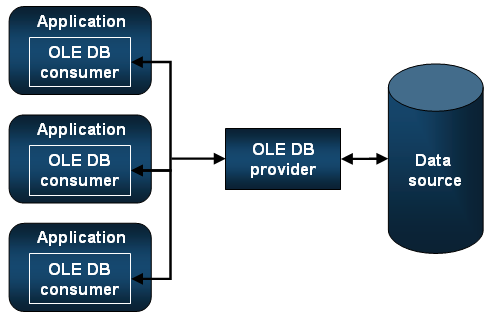OLE DB Provider
OLE DB is a Microsoft specification for accessing data on different computers. It is based on Microsoft's COM technology and is the successor to the older and limited ODBC technology.
While ODBC uses static APIs for data access and is limited to SQL, OLE DB uses ADO to provide a quick and easy facility for programming applications. You can find an example of the ADO access to the OLE DB provider in the source directory, WinCC_OA_Path/source/SampleHistDB.xls.
The WinCC OA OLE DB provider tool enables access to the historical data of WinCC OA from external programs such as Crystal Reports, MS Excel, MS Access and many others in such a way that sophisticated reports can be created using these external tools.
The OLE DB provider includes the following functions:
- Querying historical data
- Prioritizing queries in the archive
- Querying alarms.
- Access by external reporting tools (for example, Crystal Reports)
- SQL support (with certain limitations)
- Conversion of WinCC OA data types into OLE DB data types

| Chapter | Description |
| OLE DB provider, basics | Introduction to the OLE DB provider and its functions |
| Requirements for the OLE DB provider | Installation, system requirements and limitations |
| Integrating OLE DB provider in WinCC OA | Data transfer diagram and possible configuration |
| Example queries | A list of some examples using SQL expressions to query historical values and alarms in WinCC OA |
| Example: how to query data using MS Excel | This example shows how to query data using MS Excel. |
| The SQL query language | Supported commands, operators and functions, plus SQL tips and tricks |
| Fields in the HISTVAL table | Columns in the HISTVAL table whose entries can be queried using SQL |
| Fields in the ALERTS table | Columns in the ALERTS table whose entries can be queried using SQL |
| Prioritization of queries in the archive | Description of Query prioritization. Query prioritization loads the archives less with OLE DB provider queries than with DM. |
| Data types for OLE DB provider | Permitted data types and their conversion |
| Entries in the configuration file | Possible entries in the Config file for working with OLE DB provider |
| Summary and relevant links | Other relevant chapters of the Online Help |



